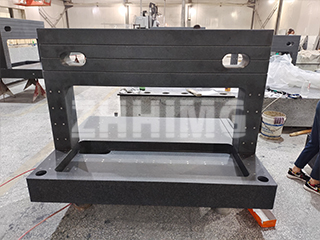Granite surface plates and other precision measuring tools are made from high-quality granite. However, not all types of granite are suitable for the production of these precision tools. To ensure the durability, stability, and accuracy of granite surface plates, the raw granite material must meet specific criteria. Below are the key characteristics that granite must possess to be used in the manufacturing of granite surface plates and other related measurement tools.
1. Hardness of Granite
The hardness of granite is one of the most important factors when selecting raw material for granite surface plates. Granite used for precision tools must have a Shore hardness of around 70. A high hardness ensures that the granite surface remains smooth and durable, providing a stable, reliable measurement platform.
Additionally, unlike cast iron, granite is resistant to rust and corrosion, making it ideal for environments with high humidity or temperature fluctuations. Whether used as a granite inspection plate or as a worktable, granite ensures smooth movement without any unwanted friction or sticking.
2. Specific Gravity of Granite
Once granite meets the required hardness, its specific gravity (or density) is the next crucial factor. Granite used for making measurement plates must have a specific gravity between 2970–3070 kg/m³. Granite has a high density, which contributes to its thermal stability. This means that granite surface plates are less likely to be affected by temperature changes or humidity, ensuring accuracy and precision during measurements. The stability of the material helps prevent deformation, even in environments with fluctuating temperatures.
3. Compressive Strength of Granite
Granite used for manufacturing precision measurement tools must also exhibit high compressive strength. This strength ensures that the granite can withstand the pressure and force exerted during measurements without warping or cracking.
The linear expansion coefficient of granite is 4.61×10⁻⁶/°C, and its water absorption rate is less than 0.13%. These properties make granite exceptionally suitable for the production of granite surface plates and other measurement tools. High compressive strength and low water absorption ensure that the material maintains its precision and smoothness over time, with minimal maintenance required.
Conclusion
Only granite with the right physical properties—such as sufficient hardness, specific gravity, and compressive strength—can be used to produce high-precision granite surface plates and measuring tools. These materials are crucial for ensuring the long-term accuracy, durability, and smooth operation of your precision measuring instruments. When selecting granite for manufacturing measurement tools, it’s important to ensure that the raw material meets these stringent specifications.
Post time: Aug-05-2025

